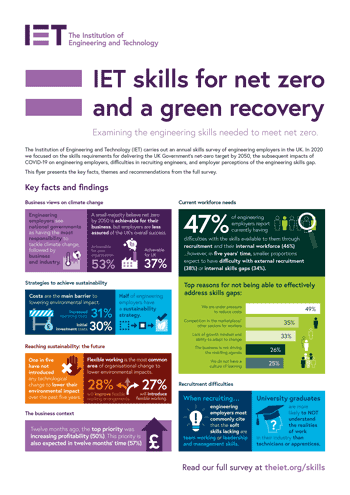Only half of UK engineering firms think achieving net zero by 2050 will be possible for them. And only 7% of engineering companies with a sustainability strategy say they have the skills needed to fulfil it.
These are among the findings of a new skills survey by the Institution of Engineering and Technology, Skills for net zero and a green recovery.
The survey, which looked at the skllls engineering employers need to meet net-zero targets, found only 55% of engineering employers had a sustainability strategy that identified specific activities and goals. Only 7% said they had the skills needed to fulfll the strategy.
Almost half, 46%, said they were currently experiencing skills gaps. To address this, 47% were choosing to retrain or upskill existing employees with 44% seeking to hire new employees with those skills. A smaller proportion, 32%, were adopting the approach of recruiting apprentices or graduates and providing training.
Considering new recruits, 43% of engineering employers agreed that university graduates did not have the necessary skills to work in their industry. Almost as many, 38%, said apprentices did not understand the realities of work in their industry.
At the same time priorities have shifted with the impact of the Covid-19 pandemic. Top priorities are now well-being of staff and dealing with economic uncertainty (both on 68%), replacing increasing profitability which was cited by 50% a year ago. Recruiting staff with new skills is currently engineering employers’ lowest priority, the survey found.
Regarding who should be accountable for tackling climate change, 25% of respondents thought the greatest responsibility lay with the government, followed by business and industry (20%). Over half, 56%, were doubtful that net zero emissions could be achieved in the UK by 2050.
IET skills and innovation lead Stephanie Baxter said: “To deliver on the UK’s net-zero challenge, the standout issue with recruitment is a lack of people with the right specialist skills or knowledge, and this poses a huge risk to advancing our green recovery. This is coupled with a huge change in business priorities. While only 7% of businesses with a green recovery strategy say they have the right skills needed to fulfil it, recruitment overall is their lowest priority. We need to consider the impact this will have on furthering the UK’s sustainability agenda.”
She added: “It’s disappointing to see there is still a low perception of the quality of young people entering the engineering sector. We believe by improving the understanding of the net-zero challenge we will be able to create work-ready recruits who understand the importance of sustainability. The responsibility to reduce the impact on the climate rests on all of us, and industry, government and educators need to collaborate to identify and deliver the essential skills needed.”


